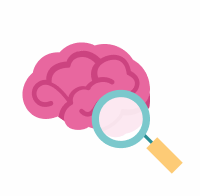About
The AD Knowledge Portal is a public data repository that stores and shares data, analyses, and tools generated by multiple collaborative research programs focused on aging, dementia, and Alzheimer’s disease (AD), funded by the National Institute on Aging (NIA). These programs embrace open science principles and require data to be released in a rapid manner, according to the NIH Genomic Data Sharing Policy. All data, methods, and results generated are distributed under F.A.I.R. (Findable, Accessible, Interoperable, and Reusable; Wilkinson et al., 2016) principles.
In total, the AD Knowledge Portal currently hosts data and resources generated across 100+ grant projects in 10+ programs or centers supported by the NIA and includes “omics” data from human samples and experimental model systems, as well as bioinformatic analyses from research teams and cross-consortium working groups.
History
The AD Knowledge Portal was originally established as part of the Accelerating Medicines Partnership in Alzheimer's Disease (AMP‐AD) program (Hodes & Buckholtz, 2016), which was initiated in 2014 between the National Institutes of Health (NIH) and several nonprofit organizations and pharmaceutical companies. Together, this public‐private partnership has funded an open, pre‐competitive discovery effort with the goal of identifying emerging target development opportunities. The Portal has since grown to support additional research programs supported by the NIA.
Our Community Data Contribution Program (CDCP) further expands the resources we are able to make available through the portal by enabling researchers who are not funded by these programs to share their data alongside other AD/ADRD datasets so that it is more discoverable by the broader research community.
AD Knowledge Portal ↔︎ Synapse
At this point, you know what the AD Knowledge Portal is, and you may have come across the term Synapse - but how do they fit together? Let’s break this down:
Sage Bionetworks | First, there’s Sage Bionetworks - a name you may or may not have come across. While Sage is not a tool you’ll be using, you should know who we are: a non-profit organization based out of Seattle, Washington. Sage is dedicated to promoting and advancing open science, as well as engaging patients in the research process. Sage acts as the Data Coordinating Center (DCC) for several different portals, including the AD Knowledge Portal (the AD-DCC - read more about that below). The scientists, developers, and designers that built the tools you’re using are all employed by Sage. You can learn more about Sage Bionetworks and its initiatives here. |
Synapse | In line with advocating for open science, Sage developed a software platform called Synapse. This platform is what allows for collaborative data curation and analysis, computational modelling, and more. It allows users to upload, store, analyze, and track data in a private space, before releasing it to the public-facing AD Knowledge Portal. Think of Synapse as the back-end for all the data to live in. |
AD Knowledge Portal | If Synapse is the back-end for data, the AD Knowledge Portal is the front. It’s essentially the user interface (UI) or entry point for you to view data and other shared content. Data gets uploaded into Synapse and made accessible for you in the portal. |
Additional Tools
Analysis Platforms
Users of the AD Knowledge portal are able to send data directly to a CAVATICA Workspace in order to run downstream analyses. This integration is one step toward a greater goal to provide seamless, secure access to biomedical datasets made available through the AD Knowledge Portal in as many analytical environments as possible.
Disclaimer
These integrations or provisions do not signify an endorsement of any particular environment by Sage Bionetworks or funders, nor does it alter the relationship between Sage Bionetworks, existing data contributors, project sponsors or funders, or computational providers.
Furthermore, it is the responsibility of individual users to review the terms of data use for each compute environment, as well as for the portal or repository from which the data is sourced. Users must personally ensure that all data access terms and conditions are met.
Agora
Agora hosts evidence for whether or not genes are associated with Alzheimer's disease (AD). Agora also contains a queryable list of over 600 nascent drug targets for AD that were nominated by AD researchers.

Model AD Explorer
This tool allows exploration of gene expression and pathology data from next generation mouse models of Alzheimer's disease developed by the MODEL-AD consortium.
The AD-DCC
Data sharing through the AD Knowledge Portal is supported by Sage through a Data Coordination Center (the AD-DCC). The AC-DCC is responsible for:
Monitoring user-contributed data to ensure it complies with the terms and conditions for funding.
Supporting data contributors as needed when it comes to uploading and disseminating data.
Supporting collaboration among data contribution teams.
Distributing data to the general research community.
Providing general support to the following tools:
Synapse
AD Knowledge Portal
Agora
Model AD Explorer
Want to learn about the people involved In the AD-DCC? Explore the team here.
